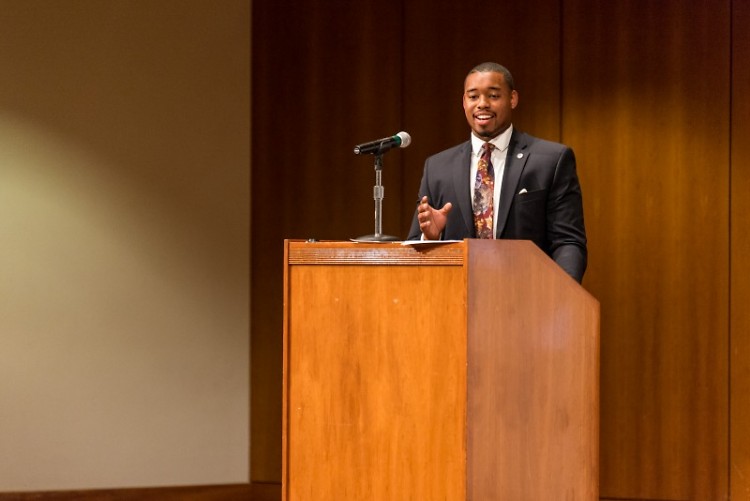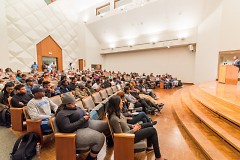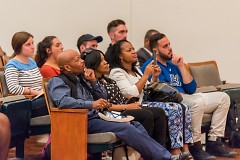Leighton Watson, a 2014 graduate of the historically-black undergraduate college Howard University, is a West Michigan native who served as an advisor on President Obama’s Taskforce on 21st Century Policing during the Ferguson crisis. He gained national attention after organizing a group of nearly 400 Howard students to take a photograph with their hands up, signifying “don’t shoot,” in an effort to protest police brutality after the 2014 shooting of St. Louis teenager Michael Brown.
The photograph was taken on August 13, 2014, and quickly went viral, sparking a nation-wide grassroots movement that inspired hundreds of other educational institutions and activists groups across the country to recreate Watson’s infamous pose as a symbol of solidarity in the wake of Brown’s death.
In a multi-part event that launched GVSU’s first ever Civic Engagement Week, Watson spoke to a large crowd of nearly one-hundred fifty who gathered in Allendale at the university’s Cook-Dewitt Center Monday night. The majority of the audience was composed of students; other attendees included leaders from GVSU’s Black Students Union and NAACP Chapter, as well as several faculty members and various leaders from the Grand Rapids community.
The event was organized by GVSU’s Community Service Learning Center and prompted by this year’s upcoming presidential election.
“Students hold so much power as a voting block, and there’s a lot of room for students to move at a grass roots level,” said Melissa Baker-Boosamra, Associate Director for Student Life, Civic Engagement and Assessment at GVSU. “People are trying to make sense of where we are as a nation right now, and a lot of students in particular are having a hard time seeing themselves aligned with either candidate. The rhetoric has become so divisive and frankly hostile that it’s an important time for Grand Valley as an educational institution to help students learn how to become more educated on issues, how to talk with people from diverse backgrounds about their perspectives, and to elevate the importance of civility.”
The event began at 7 p.m. with opening remarks from Baker-Boosamra, followed by comments from Eileen Sullivan, Vice Provost for Student Affairs and Dean of Students, and Jesse Bernal, Vice President for the Division of Inclusion and Equity at GVSU. Each welcomed Watson to campus and spoke to the importance of civil discourse and equality at GVSU. Toni Jackson, NAACP-GVSU Chapter President, then introduced Watson and invited him to the stage.
Watson began his speech by recounting his own personal history, and spoke humbly about his collegiate experiences and opportunities to work alongside President Obama and legislators in Washington D.C.
Nevertheless, he admitted that he was deeply saddened to be speaking on an issue as fundamental as racial equality in the year 2016. “All I want to do is shorten the distance between what America is on paper and what it is in reality,” Watson said, urging the audience to consider the difference between America’s theoretical values and the actuality that racial prejudice and social inequality continue to destroy the lives of millions, even today.
As Watson spoke, his voice was filled with sincerity and urgency.
“We’re in the second civil rights movement,” Watson said. “My question for you is this: fifty years from now, when we look back in the history books and your grandchildren ask you where you were, what are you going to say? What are you willing to do now?”
Watson explained that real, long-term change requires every individual citizen to realize their own role in the Black Lives Matter movement and to create an atmosphere of tolerance and respect. Warning that the worst, most racist mentalities exist even here in Grand Rapids, Watson forced attendees to personally consider racism and police brutality within the context of their own community.
“I believe that Grand Rapids is one bullet away from being the next Ferguson,” said Watson. “Before it becomes that, what can we do preemptively?”
Preemptive, long-term, practical solutions were a consistent theme throughout Watson’s speech, which proposed several legislative remedies aimed toward minimizing policy brutality. Watson also encouraged the audience to read the Final Report of the President’s Task Force on 21st Century Policing, which offers sixty strategies that all cities can utilize in order to help build stronger relationships between local law enforcement and communities.
The second half of the event was dedicated to a moderated question and answer period, where audience members were able to ask Watson real, locally-applicable questions. Students eagerly participated and asked questions that included how black students can become more active on campus and how student organizations might be able to join forces and work together to advance social justice at GVSU.
Finally, Watson offered several suggestions as to how the audience might address criticism from individuals who disagree with the Black Lives matter Movement or who oppose methods of nonviolent protest, which he advocated strongly for.
“The most memorable part of the speech, for me, was when he talked about how important it is to have interracial, rather than intra-racial, conversations,” said Alayne Vaughn, fifth-year senior at GVSU. “People of all races have to be a part of the conversation and have to learn from each other in order to come together and really effect change.”
The Rapidian, a program of the 501(c)3 nonprofit Community Media Center, relies on the community’s support to help cover the cost of training reporters and publishing content.
We need your help.
If each of our readers and content creators who values this community platform help support its creation and maintenance, The Rapidian can continue to educate and facilitate a conversation around issues for years to come.
Please support The Rapidian and make a contribution today.


